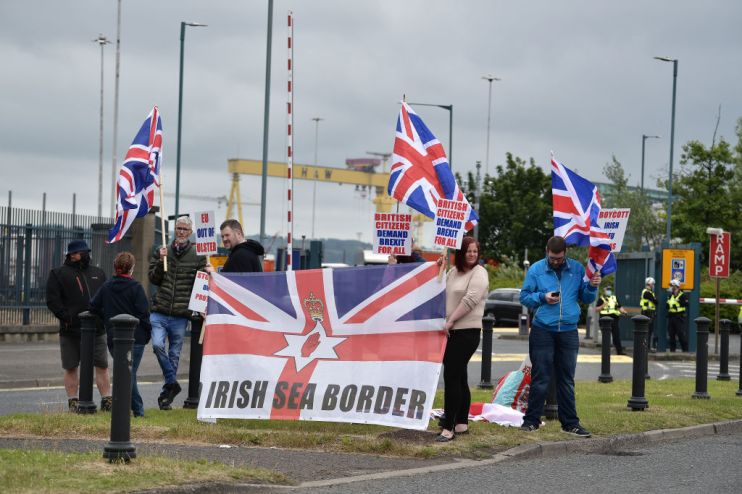City lawyer takes government to High Court over Northern Ireland Protocol

Four businesses will submit evidence against the government to England’s High Court in the coming weeks in a bid to prove the Northern Ireland Protocol infringes on the European Convention of Human Rights.
Clive Thorne, partner at City of London firm McCarthy Denning, is representing the four Northern Irish businesses and says he is trying “show they have suffered damage as a result on the restrictions on trade between Great Britain and Northern Ireland that have arisen as a result of the protocol”.
The post-Brexit protocol sees Northern Ireland follow EU customs union and single market rules, unlike the rest of the UK, in order to avoid a hard border with the Republic of Ireland.
This has meant a staged implementation of border checks for some goods crossing between Great Britain and Northern Ireland, creating a so-called border in the Irish Sea.
The UK’s defacto Brexit minister Lord David Frost said yesterday that some companies have said it is “too much trouble” to continue trading with Northern Ireland due to the post-Brexit agreement.
Two of the businesses involved in the case against the government – logistics companies Blair International and R Barkley & Sons Haulage – have claimed the new rules have made massive dents in their respective bottom lines.
DUP MP Ian Paisley is involved in the claim.
Thorne told City A.M. that the two haulage companies “have had to engage further staff and further premises, which adds to their costs and their profitability”.
He said evidence for the case, which is set to be served to the High Court in the next two weeks, will come from a wide range of sectors to show how the protocol has led to a loss of income for a swathe of businesses.
“What we’re trying to do is get a declaration that the protocol is incompatible with the European Convention of Human Rights, which does provide for freedom of trade,” he said.
“If we get that declaration then it’s open for individual companies to rely on that and subsequently seek compensation from the United Kingdom government, which could be very considerable.”
A series of checks on goods like food, mail and medicines going between Great Britain and Northern Ireland were postponed earlier this year by the UK until October.
A delay on the upcoming ban on chilled meats going from Great Britain to Northern Ireland was also agreed between the UK and EU last month.
However, customs declaration forms and checks on some goods are still currently required for some goods.
The UK and the EU are currently negotiating over how to implement the protocol, with Boris Johnson’s government calling for a less bureaucratic approach to checks by the EU.
The government claims that around 20 per cent of all EU border checks now happen in Northern Ireland.
The claim, if successful, could open up the government to legal challenges from businesses aiming to get compensation.
There are concerns the implementation of the protocol in its current form will lead to widespread food and medicine shortages in the Northern Ireland later this year.
The EU, meanwhile, says it is following the protocol to the letter of the law and is trying to stop unchecked goods coming into its single market through Northern Ireland.
Professor Catherine Barnard, deputy director at the UK in a Changing Europe think tank, said there were bound to be “lots of claims coming out of the Northern Ireland Protocol, because it is controversial”.
However, she doubted how successful Thorne and his clients will be in their legal claim.
“Economic rights tend to be less well protected than other rights and they need to be balanced against what the government is trying do, which they say is in the best interest,” she said.
“From a legal perspective, I suspect this claim is more about a political strategy to try and get government to sort out the problems [with the protocol].”
Barney Reynolds, partner at the Shearman & Sterling law firm, said “it’s clear that the Northern Ireland Protocol is incompatible with various rights” and praised Thorne’s High Court action.
“This is an important action. Such points should be considered by our courts, which have so far been reluctant to interfere with any EU law scheme – and that is what the protocol essentially is,” he said.
A court challenge to the protocol was dismissed by Belfast’s high court just two weeks ago, after claimants argued that it breached the 19th century legislation that created the UK.
Among the claimants were the Democratic Unionist Party (DUP) who have suffered immensely from the backlash against the protocol.
Large pockets of the unionist community in Northern Ireland have expressed outrage about the protocol as it treats their country different to the rest of the UK.
The anger with the protocol led to two DUP leaders being ousted within five weeks and helped spark weeks of violent rioting in Belfast earlier this year.